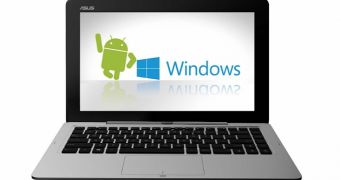Hybrid devices that can run two completely different operating systems, such as Windows and Android, are gaining ground these days, especially because manufacturers worldwide are trying to provide users with a better mix of the two that would better tackle their needs.
It turns out, however, that Microsoft might be actually trying to stop Windows – Android hybrid devices from hitting the shelves, pretty much because it doesn’t agree with a device that runs another operating system developed by a rival.
The news comes via CNET which is reporting via unnamed sources that Asus might have no other choice than to stop development of the Transformer Book Duet TD300 due to undisclosed reasons.
Promoted by both Asus and Intel as the right device that could bring you the best of Android and Windows at the same time, the Transformer Book Duet TD300 was designed to run the core version of Windows 8.1 and Android 4.2.2, featuring a 13.3-inch full HD display, an Intel Core i7 processor, 4GB of RAM and 128GB of storage on an SSD.
At the same time, Microsoft is also said to be planning some major improvements for the Windows platform, including adding support for Android apps that would be able to run on a traditional PC just like the existing Metro apps.
That would be possible if an internal project currently on the tablet at Microsoft goes through, with people familiar with the matter claiming that the first implementation of this new feature could see daylight in Windows 9 in early 2015.
Android apps on Windows would clearly be a major step forward for Microsoft, especially because the company still struggles to improve the Modern UI and thus make the new Metro environment a bit more appealing for users of its new modern operating system.
At the same time, it could also come in handy when trying to tackle the rapid growth of Chromebooks, as Microsoft still needs to find a way to boost its market share and compete against products coming from its rivals.
Running Android apps of Windows is already possible with BlueStacks, but it appears that Microsoft is actually trying to make this a native Windows feature, which would basically lead to a smoother integration and the possibility to download, install and run Android software from a common store.
Windows 9, the first OS version that’s supposed to come with support for Android apps, is likely to launch in early 2015, one year after the debut of Windows 8.1 Update 1.

 14 DAY TRIAL //
14 DAY TRIAL //